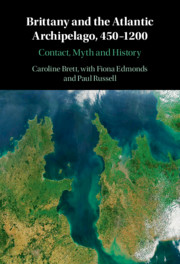2 results
3 - Interlude: A View from the Celtic Island
-
- Book:
- The Long Journey of English
- Published online:
- 25 May 2023
- Print publication:
- 08 June 2023, pp 31-41
-
- Chapter
- Export citation

Brittany and the Atlantic Archipelago, 450–1200
-
- Published online:
- 21 October 2021
- Print publication:
- 28 October 2021


